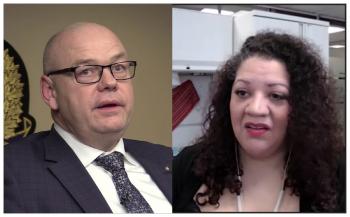Image Caption
Summary
Local Journalism Initiative Reporter
Windspeaker.com
An accounting of how Edmonton Police Services (EPS) has progressed in reaching policing goals set out by the Truth and Reconciliation Commission’s report on the legacy of Indian residential schools and the recommendations of the National Inquiry on Missing and Murdered Indigenous Women and Girls will demonstrate the impact the Nîsohkamâkewin Council has had on policing in the city.
EPS announced Friday that it was moving forward on establishing three community committees: Nîsohkamâkewin Council, which will focus on the relationship between Indigenous communities and the police; the Sexual Orientation, Gender Identity and Expression Council (SOGIE), which will guide EPS on supporting the S2LGBTQ+ community; and the Chief’s Community Council, which will help shape EPS polices and procedures related to all communities.
“At the end of the year there, we should be able to report clearly what we’ve got completed. We can be held accountable to that. We might not get it all done, but what I want to see is progress,” said EPS Chief Dale McFee.
Accountability is a big piece for Christie Pace, outgoing co-chair of the Nîsohkamâkewin Council. She said seeing changes is the only way to know that the council has been heard and their points of view validated.
“If we feel that’s not happening, we’ll have to address it,” said Pace, who is now the Indigenous Relations coordinator with EPS. She said she believes that will be the step all three councils will take if they don’t feel changes are happening.
While the councils were officially launched last week, they have been organizing and setting parameters for public engagement for the past year. Measures to combat the coronavirus pandemic slowed their progress.
In that time, Pace moved from being co-chair of the Nîsohkamâkewin Council to filling an eight-month vacant position with EPS as Indigenous Relations coordinator.
Speaking on behalf of the Nîsohkamâkewin Council last week, Pace said not only does the council want to see the policing recommendations from the TRC and national inquiry on MMIWG implemented, but also recommendations from the Royal Commission on Aboriginal Peoples (1996) and, most recently, the Broken Trust report, although it is specific to Indigenous people and the Thunder Bay Police Service.
“(We need to) look at how we can change policy within policing to have a change in how that impacts Indigenous people,” she said.
McFee said he sees the committees as more than “just checking a box …. (they’re) more proactive than just solving problems.”
Edmonton is a diverse city, he said, with “more than its share” of both social and criminal challenges.
“They’re not the same but unfortunately they get blended together,” McFee said.
These three committees, he said, provide him with “real people” and not social media postings that will help drive the EPS “to reduce the intake into the justice system and that’s done through relationships.”
He said the councils will provide other points of view that EPS will take into consideration as they make decisions and allow for “real time” changes.
Nîsohkamâkewin Council, a Cree word meaning “the act of helping,” consists of people from the Indigenous community, selected based on their subject matter expertise, lived experience, and a desire to make changes in policing for their community.
In a statement from Nîsohkamâkewin Council co-chairs James Henry and Laura-Ann Wahsatnow, the pair noted that the Indigenous community was “still in the process of healing and repairing the damage of past harms” from EPS and change only came about when it was “based on a foundation of respect.”
“We want policing to be an extension of the community,” said McFee.
“If we want to have the shift in terms of how policing is done in a tangible meaningful way, I still go back to policy change and investing in policy change to create policies that would also invest in our police officers so that they can be better informed, have better understanding of the community that they’re servicing,” said Pace.
McFee said there was no shelf-life for the councils. Instead, he anticipated the councils evolving as processes and needs changed and those voices continuing to play an important role.
“I also need to use my voice as the chief of police to help change the community, too. Not my authority, but my voice. It’s a relationship where we can use each other’s voices to get to better places,” said McFee.
The three councils will be advising EPS on emerging issues and operational changes, said an EPS statement.
McFee is Edmonton’s first Métis police chief. He began his position in February 2019.
Local Journalism Initiative Reporters are supported by a financial contribution made by the Government of Canada.

